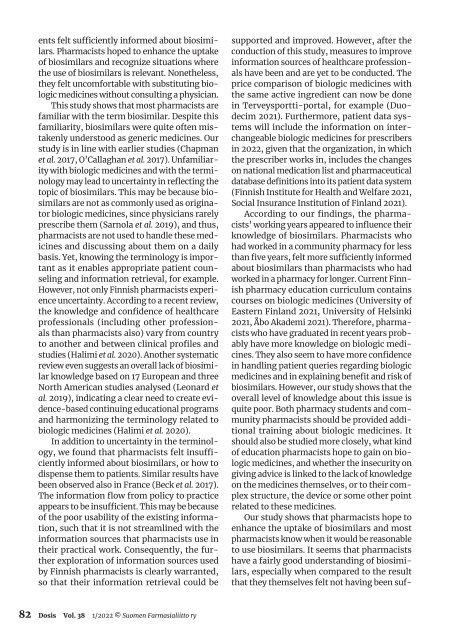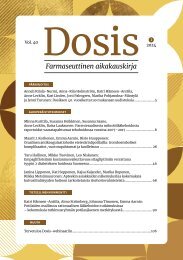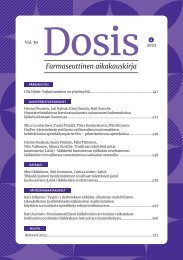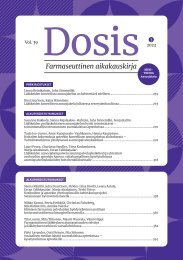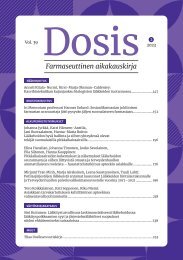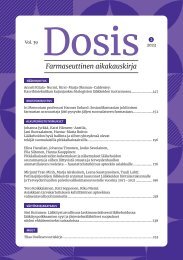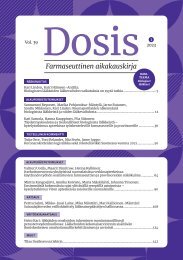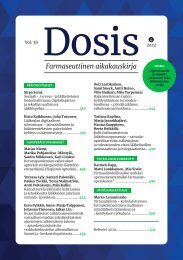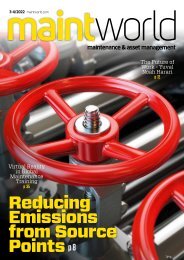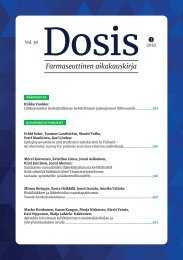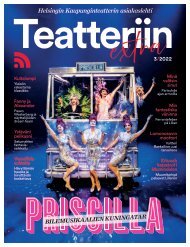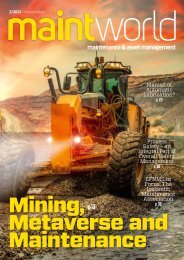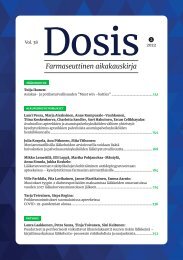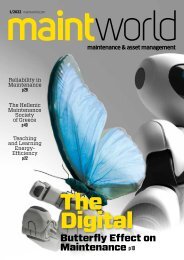DOSIS 1/2022
Farmaseuttinen aikakauskirja DOSIS 4/2021 vol.37 5uomen Farmasialiitto ry
Farmaseuttinen aikakauskirja DOSIS 4/2021 vol.37 5uomen Farmasialiitto ry
You also want an ePaper? Increase the reach of your titles
YUMPU automatically turns print PDFs into web optimized ePapers that Google loves.
ents felt sufficiently informed about biosimilars.<br />
Pharmacists hoped to enhance the uptake<br />
of biosimilars and recognize situations where<br />
the use of biosimilars is relevant. Nonetheless,<br />
they felt uncomfortable with substituting biologic<br />
medicines without consulting a physician.<br />
This study shows that most pharmacists are<br />
familiar with the term biosimilar. Despite this<br />
familiarity, biosimilars were quite often mistakenly<br />
understood as generic medicines. Our<br />
study is in line with earlier studies (Chapman<br />
et al. 2017, O’Callaghan et al. 2017). Unfamiliarity<br />
with biologic medicines and with the terminology<br />
may lead to uncertainty in reflecting the<br />
topic of biosimilars. This may be because biosimilars<br />
are not as commonly used as originator<br />
biologic medicines, since physicians rarely<br />
prescribe them (Sarnola et al. 2019), and thus,<br />
pharmacists are not used to handle these medicines<br />
and discussing about them on a daily<br />
basis. Yet, knowing the terminology is important<br />
as it enables appropriate patient counseling<br />
and information retrieval, for example.<br />
However, not only Finnish pharmacists experience<br />
uncertainty. According to a recent review,<br />
the knowledge and confidence of healthcare<br />
professionals (including other professionals<br />
than pharmacists also) vary from country<br />
to another and between clinical profiles and<br />
studies (Halimi et al. 2020). Another systematic<br />
review even suggests an overall lack of biosimilar<br />
knowledge based on 17 European and three<br />
North American studies analysed (Leonard et<br />
al. 2019), indicating a clear need to create evidence-based<br />
continuing educational programs<br />
and harmonizing the terminology related to<br />
biologic medicines (Halimi et al. 2020).<br />
In addition to uncertainty in the terminology,<br />
we found that pharmacists felt insufficiently<br />
informed about biosimilars, or how to<br />
dispense them to patients. Similar results have<br />
been observed also in France (Beck et al. 2017).<br />
The information flow from policy to practice<br />
appears to be insufficient. This may be because<br />
of the poor usability of the existing information,<br />
such that it is not streamlined with the<br />
information sources that pharmacists use in<br />
their practical work. Consequently, the further<br />
exploration of information sources used<br />
by Finnish pharmacists is clearly warranted,<br />
so that their information retrieval could be<br />
supported and improved. However, after the<br />
conduction of this study, measures to improve<br />
information sources of healthcare professionals<br />
have been and are yet to be conducted. The<br />
price comparison of biologic medicines with<br />
the same active ingredient can now be done<br />
in Terveysportti-portal, for example (Duodecim<br />
2021). Furthermore, patient data systems<br />
will include the information on interchangeable<br />
biologic medicines for prescribers<br />
in <strong>2022</strong>, given that the organization, in which<br />
the prescriber works in, includes the changes<br />
on national medication list and pharmaceutical<br />
database definitions into its patient data system<br />
(Finnish Institute for Health and Welfare 2021,<br />
Social Insurance Institution of Finland 2021).<br />
According to our findings, the pharmacists’<br />
working years appeared to influence their<br />
knowledge of biosimilars. Pharmacists who<br />
had worked in a community pharmacy for less<br />
than five years, felt more sufficiently informed<br />
about biosimilars than pharmacists who had<br />
worked in a pharmacy for longer. Current Finnish<br />
pharmacy education curriculum contains<br />
courses on biologic medicines (University of<br />
Eastern Finland 2021, University of Helsinki<br />
2021, Åbo Akademi 2021). Therefore, pharmacists<br />
who have graduated in recent years probably<br />
have more knowledge on biologic medicines.<br />
They also seem to have more confidence<br />
in handling patient queries regarding biologic<br />
medicines and in explaining benefit and risk of<br />
biosimilars. However, our study shows that the<br />
overall level of knowledge about this issue is<br />
quite poor. Both pharmacy students and community<br />
pharmacists should be provided additional<br />
training about biologic medicines. It<br />
should also be studied more closely, what kind<br />
of education pharmacists hope to gain on biologic<br />
medicines, and whether the insecurity on<br />
giving advice is linked to the lack of knowledge<br />
on the medicines themselves, or to their complex<br />
structure, the device or some other point<br />
related to these medicines.<br />
Our study shows that pharmacists hope to<br />
enhance the uptake of biosimilars and most<br />
pharmacists know when it would be reasonable<br />
to use biosimilars. It seems that pharmacists<br />
have a fairly good understanding of biosimilars,<br />
especially when compared to the result<br />
that they themselves felt not having been suf-<br />
82 Dosis Vol. 38 1/<strong>2022</strong> © Suomen Farmasialiitto ry


